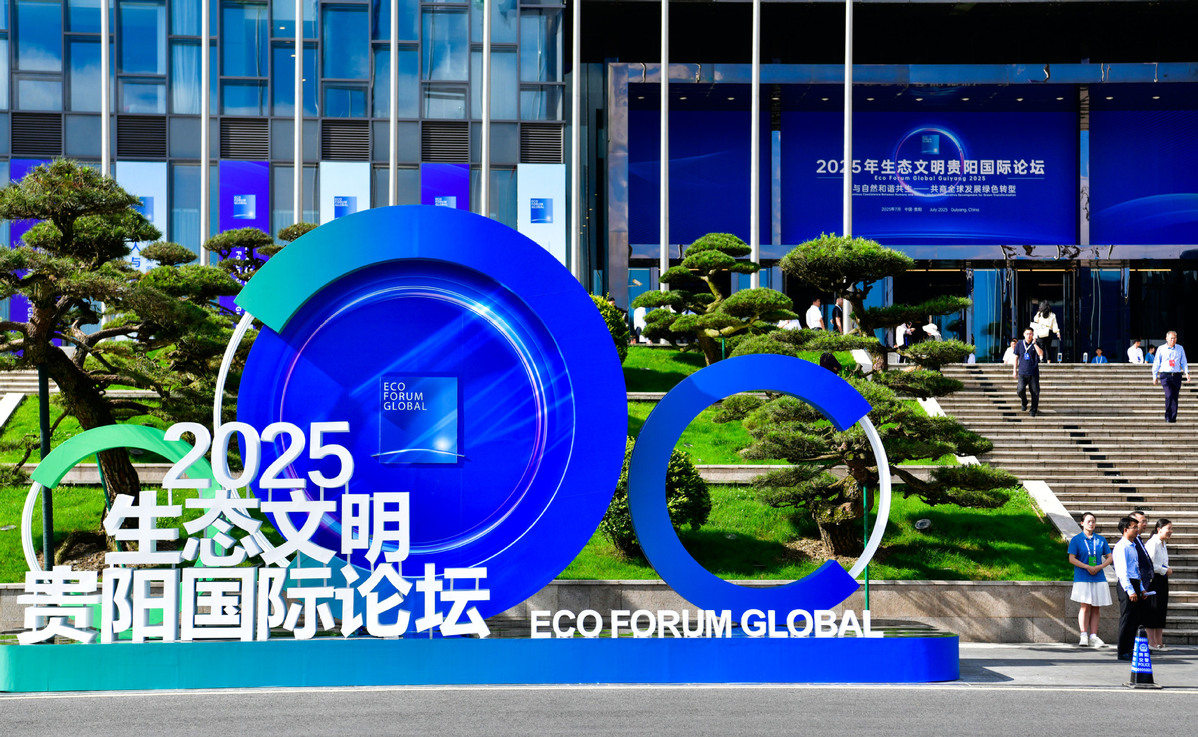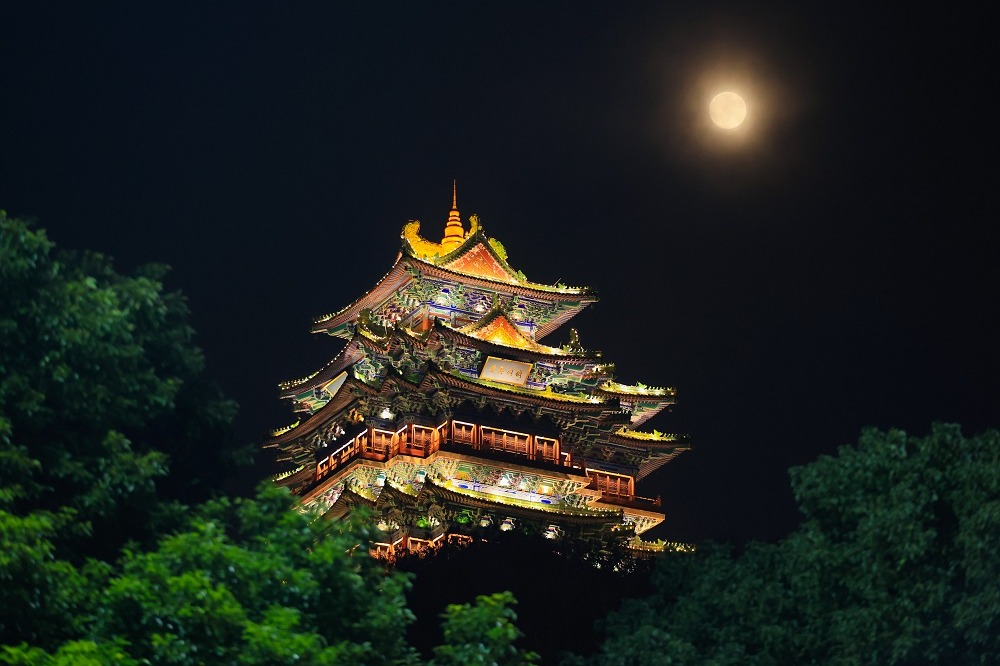Concept of ecological civilization 'inspiring'


China's concept of ecological civilization, while guiding the country to make remarkable environmental improvement, has increasingly garnered global influence, overseas officials and experts said at the Eco Forum Global Guiyang 2025.
The concept has been promoted by President Xi Jinping for balanced and sustainable development featuring harmonious coexistence between humankind and nature.
At the two-day forum, which concluded on Sunday, the officials and experts underscored the potential role of the concept in helping the world make progress toward a more sustainable future, and to help human civilization survive and prosper amid the worsening climate crisis.
The global influence of the concept is also underscored by a project in the pipeline at Oxford University that is dedicated to research on ecological civilization.
Launched in 2009 in Guiyang, the capital of Guizhou province, the forum this year was themed "Harmonious Coexistence Between Humans and Nature — Global Collaborative Development for Green Transformation".
Morris Toiraena, deputy speaker of the National Parliament of Solomon Islands, said at the forum that the theme of the event "could not be more fitting for the times we live in".
"The forum's enduring commitment to ecological civilization — aligned with China's forward-thinking concepts, policies and actions — serves as an inspiring example for all of us," he emphasized.
For centuries, people of the Solomon Islands as well as other Pacific island nations have lived in harmony with nature, with the ocean as their lifeblood, forests as their pharmacy, and fertile soil their pantry, Toiraena said.
However, rapid industrialization and unchecked human activity in other parts of the world have disrupted this balance, Toiraena added.
Much of the fortune that wealthy nations possess was generated over decades of reckless pollution, but governments of developing countries are now tasked with dealing with the consequences, he said.
"This is unfair, immoral, and these polluting countries should take up their responsibilities," he stressed. "That is why this forum matters. The principles of ecological civilization — those you uphold here in Guiyang — are precisely what we need to embrace globally."
In an interview with China Daily, Gertjan Medema, chief scientist at the KWR Water Research Institute in the Netherlands, said there has been a notable shift in the development pattern in the past two decades in China as the country strives to promote ecological civilization, which is "really what we need to strive for".
"What I see when I visit now is about building in the green. So really, creating harmony between urban development and natural development is what I see. And I applaud China for that," said Medema, who first visited China when he went to Shanghai in 2005.
Gaining momentum
China's ecological civilization process especially gained momentum after the 18th National Congress of the Communist Party of China in 2012, which saw the concept inscribed in the CPC's Constitution.
In 2017, Xi, who is also general secretary of the CPC Central Committee, said in his report to the 19th National Congress of the CPC that building an ecological civilization is vital to sustaining China's development.
"We must realize that lucid waters and lush mountains are invaluable assets and act on this understanding, implement our fundamental national policy of conserving resources and protecting the environment, and cherish the environment as we cherish our own lives," Xi said.
In 2018, ecological civilization was included in the nation's Constitution. At a tone-setting national ecological and environmental protection conference held that year, Xi Jinping Thought on Ecological Civilization was officially established.
China has made remarkable strides in environmental conservation and green development since 2012 under the guidance of the concept.
For instance, when in 2013 Beijing started monitoring levels of PM2.5 — airborne particles that are 2.5 micrometers in diameter or smaller and are harmful to health — the annual average density of the pollutant in the city was 89.5 micrograms per cubic meter. In 2024, that figure had dropped to 30.5.
According to the National Energy Administration, China's installed renewable energy capacity reached almost 2.02 billion kilowatts by the end of April, up 58 percent year-on-year. Combined wind and solar power capacity hit 1.53 billion kW, surpassing thermal power for the first time.
James Thornton, founder of the environmental law organization Client Earth and a professor at Oxford University's Smith School of Enterprise and the Environment, said that China's ecological civilization concept is "the most advanced globally of any approach for humans living harmoniously with the planet".
Over the past 50 years, the environmental movement has been discussing how humankind can live in harmony with nature, and the concept of ecological civilization brings together all of the relevant aspects of living in harmony, he said.
Thornton, who has visited China frequently in the past 12 years, said he has witnessed how China has turned this conceptual framework into reality.
"It's relatively easy to come up with ideas. Taking those ideas and making them real is the hard part, and China has done very well. And every time I come back, I see progress," he said.
Global significance
Thornton also emphasized the global significance of China's endeavor to promote ecological civilization, saying that it is now vital for the rest of the world to learn from the theoretical as well as practical advances that China has made in ecological civilization.
"I see it as the best hope for human beings, (for) human civilization to survive and prosper in this era of climate change, so as to reduce the impacts of climate change and of biodiversity loss," he said, adding that very few people in the West understand the advances that China has made with ecological civilization.
"We see in the Western press individual stories about electric vehicles, or about solar panels or about high-speed transit in China. But what is not understood even by the most advanced commentators ... is that this is all part of an overarching, synergistic view which the Chinese have, which is what I think is likely to save human civilization, not just Chinese civilization," he said.
Thornton said that he intends to set up a project at Oxford in which Western scholars can focus on studying ecological civilization.
"For many years, Chinese scholars have opened their eyes to what's going on in the West and brought the advances from the West back to China with Chinese characteristics," he said.
"Now I would like to make that mutual and have Western scholars study ecological civilization and then bring it to the West with Western characteristics."
Liu Boqian and Wei Zijia contributed to this story.





































